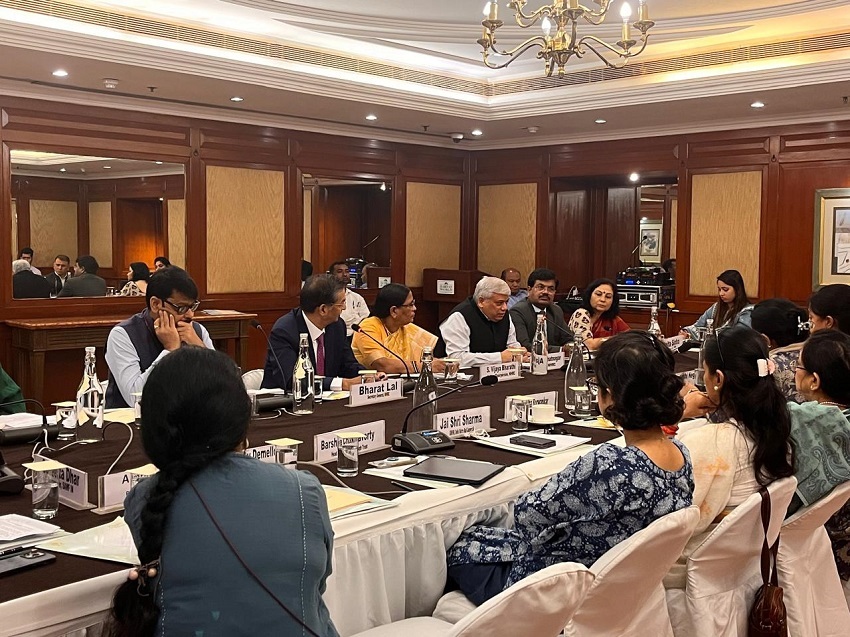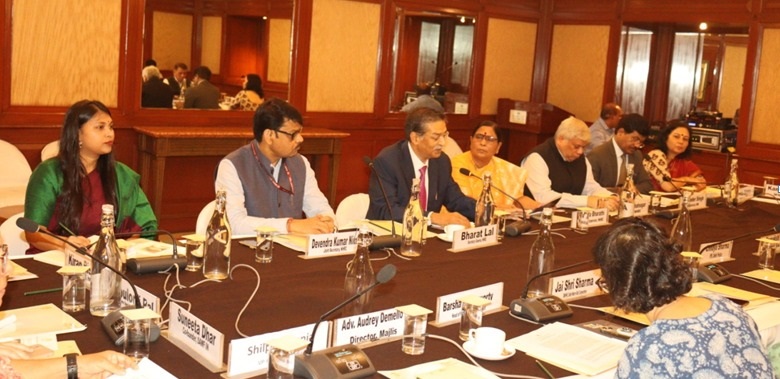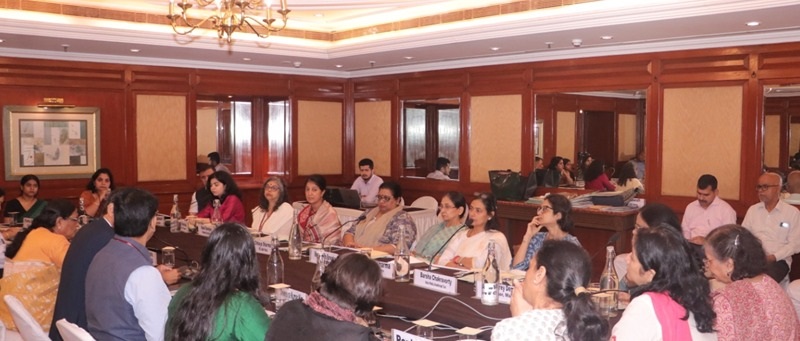NHRC, India’s National Symposium on Women’s Safety at Work & Public Spaces concludes with many suggestions in New Delhi today
Press release
National Human Rights Commission
New Delhi: 9th September, 2024
NHRC, India’s National Symposium on Women’s Safety at Work & Public Spaces concludes with many suggestions in New Delhi today
NHRC Acting Chairperson, Smt. Vijaya Bharathi Sayani, says women’s safety at public and work places need to be addressed with a holistic approach
Emphasizes strengthening of the implementation of existing laws to hold perpetrators accountable
Safety and social audits of cities and institutions suggested for ensuring women’s safety at the workplace and public spaces in collaboration with professional institutions and organizations
Gender sensitization at all levels including schools, colleges, workplaces, top management of all major organization, as well as in law enforcing systems necessary to adopt a preventive approach towards women’s safety with the help of civil society
A national symposium on Women’s Safety at Work & Public Spaces organized by the National Human Rights Commission (NHRC), India at the India Habitat Centre, in New Delhi today concluded with many suggestions to improve women's safety. Chairing it, NHRC, India Acting Chairperson, Smt. Vijaya Bharathi Sayani said that there have been a lot of efforts in terms of the legal provisions and policies for women’s empowerment in the country. However, they continue to face barriers both at the workplace and in public spaces which need to be addressed with a holistic approach.

She said that the incidents of violent sexual abuse of women are not isolated in nature, and require collective efforts on our part to ensure an effective response. She stressed strengthening the implementation of existing laws and holding perpetrators accountable. This, she indicated, must be done by improving the criminal justice system, sensitizing the public, and creating better support mechanisms for survivors, through collaboration between all stakeholders.

Earlier, triggering the discussions, NHRC Secretary General, Shri Bharat Lal spoke about the challenges faced by women in India today, especially those between the ages of 18-30 years. He said that more and more women are entering the workforce and public spaces in India. However, several incidents of crimes against them are also happening. He said that as a society, there should be a collective effort to contribute towards the safety and security of women.
Shri Ajay Bhatnagar, Director General, NHRC, spoke about how the violence against women is driven by unequal power dynamics. He stressed the need to look for equity rather than equality, to recognize and be sensitive to the needs of women and girls. He also noted that the media and movies also need to ensure that incidents like stalking do not get glorified as these have a direct bearing on the psyche and mentality of the society at large. He also emphasized the need to involve men and boys at all levels to make society safe for women.
NHRC Joint Secretary, Smt. Anita Sinha said that the trauma faced by a woman can directly affect her psychological well-being, as well as prevent other women and girls from stepping out of the house. Referring to some of the recent incidents of sexual assault, she said it is time to work collectively for the prevention of such incidents.
Representatives from various ministries, national commissions, and police reflected upon several initiatives that have been taken by the government to ensure women’s safety in the workplace and public spaces. Some of the initiatives discussed include the Nirbhaya Fund, Mission Shakti, the Safe City Project, SHE-Box 2.0, increased surveillance by police through CCTV cameras, lighting of dark spots in the city, gender sensitization programmes at the school and college level, and other similar programmes.

Some of the suggestions among others that emanated during the discussions were as follows;
1. Safety and social audits of cities and institutions need to be carried out to get a better idea about the lags and issues that currently exist in terms of ensuring women’s safety when they enter the workplace and public spaces, preferably in collaboration with professional institutions and organizations;
2. Better implementation of laws is needed to make sure that policies translate into tangible outcomes to improve the safety of women both at home, and outside;
3. Have gender sensitization at all levels including schools, colleges, workplaces, top management of all major organizations, as well as in law enforcing systems, to adopt a preventive approach towards women’s safety with the help of civil society;
4. Media in all its manifestations also needs to have guidelines for reporting crimes against women;
5. Concentrated efforts need to be made to encourage bystander intervention in reporting crimes;
6. As a society, the issue of women’s safety must be seen as a collective responsibility of all. It is imperative to collaborate productively rather than reacting once a major incident has occurred;
7. Ensure all workplaces with working and proactive Internal Complaints Committees (ICC) to make women feel safe and comfortable.
The Commission will further deliberate upon more such inputs to finalize its recommendations. The symposium was attended by Ms. Meenakshi Negi, Member Secretary, NCW, Ms. Rupali Banerjee Singh, Member Secretary, NCPCR, Shri Pritam Yashwant Joint Secretary, MoWCD, Ms. Chhaya Sharma, Spl. Commissioner(Training), Delhi Police, Ms. Meeran Chadha Borwankar, former IPS, Ms. Kanta Singh, Deputy Representative, UN Women India, Shri Virat Bhatia, Managing Director, Apple India, Smt. Jai Shri Sharma, GM-HR, Delhi Metro Rail Corporation, Shilpa Lavania, VP-Human Resources, Invest India, Kiran Bishnoi, Sr AVP – Legal, Invest India, Prof. Ritu Gupta, Professor of Law at National Law University Delhi, Ms. Suneeta Dhar, Co-founder SAWF IN, Ms. Barsha Chakravorty, Head of Media, Breakthrough Trust, Ms. Amrita Thakur, Project Manager, Jagori, Ms. Poulomi Pal, Programme Specialist – EVAW, UN Women India.
****







 राष्ट्रीय मानव अधिकार आयोग, भारत
राष्ट्रीय मानव अधिकार आयोग, भारत

